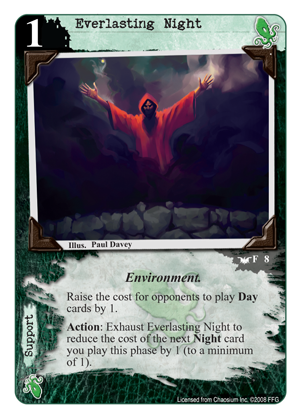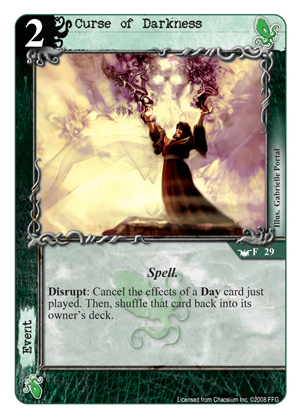.png)
The recent announcement of the upcoming Call of Cthulhu: The Card Game Asylum Pack Ebla Restored generated both excitement and a lengthy rules debate over the two cards we chose to preview. Here, Lead Developer Damon Stone addresses the confusion regarding these two cards and offers clarification.
Damon Stone on Alyssa Graham and The Parlor:
There has been some debate about how the cards Alyssa Graham (Ebla Restored, 46) and The Parlor (Ebla Restored, 47) interact. The timing of passive abilities and disrupts can lead to complicated interactions, and though we added timing charts to the most recent FAQ, we can continue to clarify these interactions to better answer players’ questions. I would like to take this opportunity to address the question of these two cards and further clarify the timing of card effects.
Passive abilities that alter how an action proceeds do so from before the beginning of the initiation of that action, whether it’s initiated as a player action or through the framework of the game. These are different than the passive abilities that trigger as a result of the action (as indicated by Step 4 of the “Actions and Responses in Detail” section of the FAQ’s Timing Structure). On the other hand, a Disrupt cannot be triggered until the action it targets has been initiated. The Disrupt halts the execution of that action before it resolves, the Disrupt is fully resolved, and then players check the resolution of the disrupted action.
To further illustrate the difference between passive abilities that alter actions and passive abilities that trigger as a result of actions, we can consider the interactions between Everlasting Night (Twilight Horror, 8), The Day Dreamer (Twilight Horror, 17), Ghoulish Hag (Search for the Silver Key, 73), and Curse of Darkness (In Memory of Day, 29).
The passive ability of Everlasting Night alters the initiation of all Day actions, including the play of a Day card. This means that Player A, looking to play The Day Dreamer, finds its cost increased by 1 before the play is initiated. Provided Player A can afford the increased cost to play The Day Dreamer, that card reads, “Day. It is Day. After The Day Dreamer comes into play, destroy all Night cards.” This passive ability triggers upon the successful play of the card, discarding all Night cards and any card such as Player B’s Ghoulish Hag, which is sacrificed “If it is Day.” However, as the FAQ illustrates, players have the opportunity to disrupt the play of The Day Dreamer, after the domain is drained, but before it resolves. In this case, Player B can respond to the declared play of The Day Dreamer by Disrupting its play with Curse of Darkness, preventing The Day Dreamer from entering play and preserving the Ghoulish Hag.
The passive ability of The Parlor works like that of Everlasting Night in the above instance, rather than that of The Day Dreamer.
The Parlor
In Call of Cthulhu: The Card Game, players draw cards one at a time, and each draw creates an opportunity for a Disrupt, but all framework or player actions that cause card draws are affected by The Parlor’s singular passive ability. The ability applies to the game before any card draw is initiated. Once any effect initiates a card draw, it designates a target card to be drawn, and The Parlor reveals the card. The completion of the draw is the addition of the card to the player’s hand. This means there is a window of opportunity in which The Parlor has revealed the card, and Alyssa Graham can then Disrupt the execution of the draw to discard that card.
Much of this confusion owes to the wording on The Parlor. The word “drawn” is used to indicate that the effect has initiated and a target has been designated, but has yet to be executed by being added to that player’s hand. The past tense use of “drawn” clearly causes confusion about when the card is revealed and whether or not the passive ability is initiated before the Disrupt. To make its effect more intuitive, the forthcoming FAQ will issue an erratum on The Parlor to read, “Before a card can be drawn by an opponent, it must first be revealed.”
I would like to apologize for the confusion, and will continue to tighten up the timing charts in the FAQ and the wording on the cards to make the game easier to understand.
–Damon Stone, Call of Cthulhu: The Card Game Lead Developer
The latest version of the Call of Cthulhu: The Card Game FAQ is available on the support page.
...




